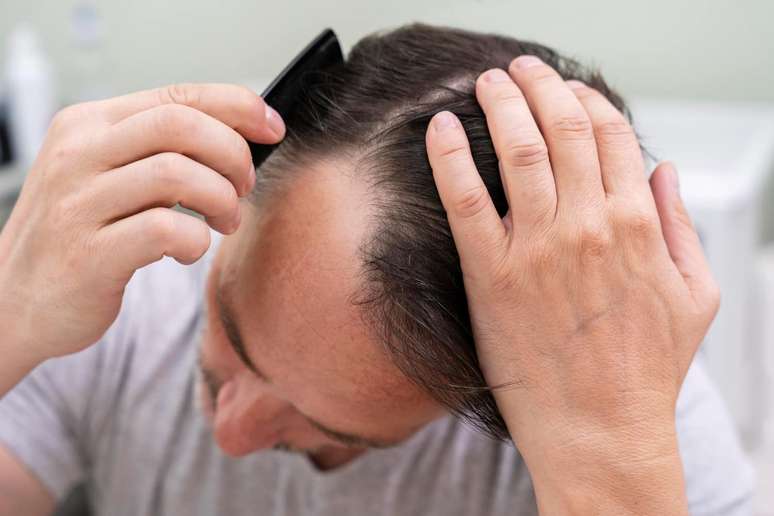Stress and lack of nutrients can also lead to hair loss.
Summary
Baldness can have causes that go beyond genetics, such as stress, diet and nutritional deficiencies, impacting self-esteem and well-being.
Baldness is usually attributed mainly to genetics, but its causes go far beyond family inheritance. Although genes play an important role, factors such as stress, diet, medications and lifestyle can accelerate the hair loss process.
Recent studies indicate that nutritional deficiencies, especially vitamin and mineral deficiencies, contribute to weakening hair. Vitamin D, for example, is essential for the health of hair follicles, as is vitamin B7, which is important for hair, skin and nails.
In Brazil, a survey conducted by the Brazilian Society of Dermatology (SBD) revealed that 42 million people suffer from some degree of baldness, a problem that affects even the youngest. Around 25% of men aged between 20 and 25 already suffer from hair loss, and many women also suffer from this condition, which has a direct impact on their self-esteem and well-being.
Stanley Bittar, CEO of Stanley’s Hair, a hair transplant company, explains that each case of hair loss must be assessed individually to identify its origin. “Baldness is generally associated with family heredity, so if there are bald family members, there is a greater chance of the problem occurring. However, even specific drugs, such as anticoagulants, can have effects on the scalp without people realizing it,” explains Bittar.
The CEO of Stanley’s Hair says that, depending on the case, hair loss can be prevented. “In some situations, dietary changes and stress control are enough to prevent hair loss. Seeking specialized help when you notice excessive hair loss or hair loss on your scalp is important, as these signs indicate that something in your body is not right and needs treatment. Our external appearance usually reflects what happens internally,” he estimates.
The market offers modern and effective solutions against baldness
Regardless of the cause of hair loss, the market presents advanced solutions to the problem, giving hope to those who want to regain their self-esteem. Alternatives include innovative medications, laser therapies and hair transplants, an effective option for those seeking long-lasting results. “The transplant involves the removal of healthy hair follicles from a donor area, usually on the back of the neck or the back of the head, which will be implanted into bald or sparsely haired areas,” explains Stanley.
The doctor emphasizes that, although the transplant is believed to be complex and painful, it is a simple, painless and rapid recovery procedure, which allows the patient to return home the same day.
Gain self-esteem
Entrepreneur and influencer Carol Magon, who has always had scalp problems, talks about how a hair transplant was decisive in improving her self-esteem.
“It was a huge annoyance. I never wore my hair tied back because of my receding hairline and used a bottle of hairspray a month to hide my flaws,” she says.
Carol explains that soon after the transplant, when her hair started to grow, the way she saw herself changed completely. “It was easier than I imagined, and today I advise other women who face the same problem to look for a solution to feel good in the mirror,” she says.
Discover 7 factors besides genetics that can contribute to baldness:
• Stress: According to Stanley Bittar, stress, whether physical or emotional, can cause a condition called telogen effluvium, in which a large amount of hair begins to fall out.
• Hormonal imbalance: Unregulated androgen hormones can cause hair loss. In women, polycystic ovary syndrome (PCOS) is one cause.
• Dysregulated thyroid: Both hypothyroidism and hyperthyroidism can impact scalp health.
• Lack of nutrients: Deficiencies in nutrients such as vitamin D, vitamin B7, iron and zinc can trigger hair loss. “Iron deficiency, for example, impairs the production of red blood cells, which transport oxygen to the hair follicles,” explains Stanley.
• Strong drugs: Anticoagulants and chemotherapy drugs, among others, can cause hair loss.
• Autoimmune diseases: Alopecia areata is an autoimmune condition that causes hair loss in round areas and can lead to total baldness.
• Inflammations caused by fungi: Fungi such as tinea capitis or Microsporum spp can cause localized hair loss. “You need to use antifungals to treat these cases,” advises the doctor.
inspires transformation in the world of work, in business, in society. Compasso, a content and connection agency, is born.
Source: Terra
Ben Stock is a lifestyle journalist and author at Gossipify. He writes about topics such as health, wellness, travel, food and home decor. He provides practical advice and inspiration to improve well-being, keeps readers up to date with latest lifestyle news and trends, known for his engaging writing style, in-depth analysis and unique perspectives.








